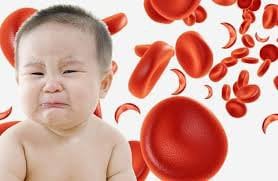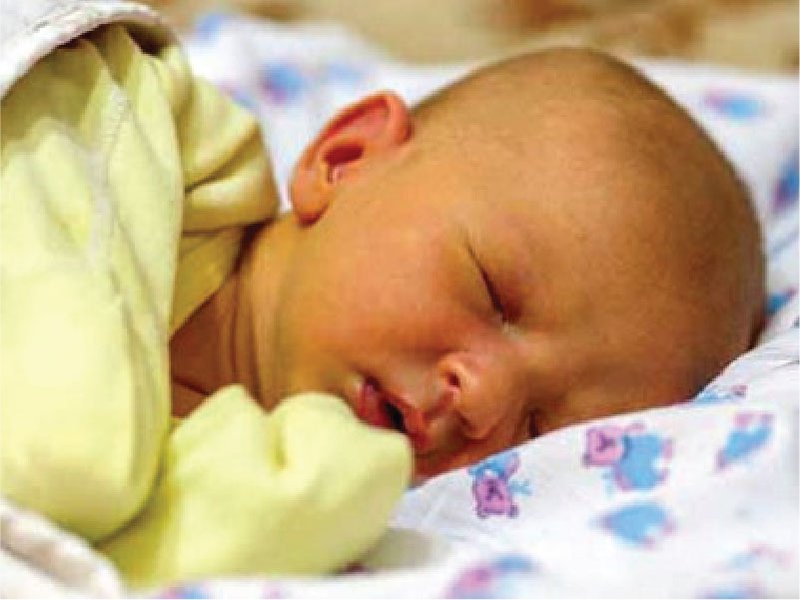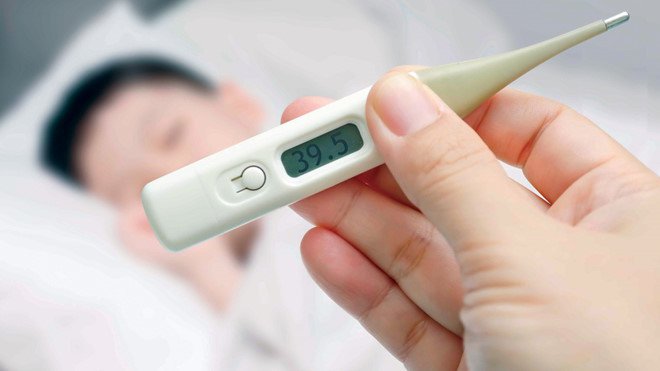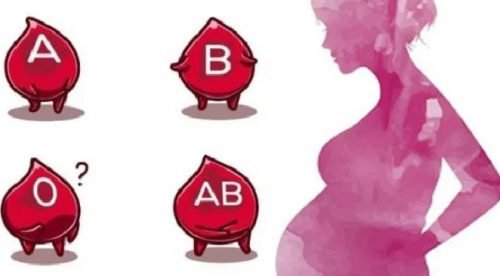What antibodies do blood group O have?
This is an automatically translated article.
Blood type is classified according to the presence or absence of certain antigens that can trigger an immune response when they are outside your body. These antigens can cause the patient's immune system to attack during a blood transfusion. So what are the characteristics of blood group O and what antibodies do people with blood type O have? Read more articles below to help you better understand this blood group.
1. What are the characteristics of blood group O?
The blood group classification system currently in use was discovered in the early 19th century, it not only brings many benefits to medicine but also tells a lot of information about human personality and health. In which, blood group O is the most common among 4 groups: A, B, AB and O.
According to the ABO blood group classification, group O is characterized by 2 factors as follows:
No A antigen and B is on the red blood cell membrane; Both A and B antibodies are present in the plasma. Therefore, people with group O will have the ability to:
For those who have the remaining group, including: A, B, AB and also O; Received from people with type O. Many studies have proven, blood type will have an effect on personality and human health. Although the mechanism of this effect has not been clearly studied, there are many valid theories that are accepted.
In terms of health, people with blood type O do not have any antibodies on their red blood cells, so the ability to recognize foreign agents and react against them is also slower. Therefore, these people will be more susceptible to diseases related to viruses, bacteria, and diseases that often progress more seriously such as: cholera, tuberculosis, mumps, plague, etc. HP bacteria are also common in people with this blood type and up to 35% higher than those of the other 3 blood types. People with blood O are prone to infections, the risk of heart disease and circulatory disease is low, so they can donate to A+, B+, AB+ but only receive O blood.
Besides, people with O blood type are at risk The risk of cardiovascular disease and cancer is lower than that of people with other blood types. Diseases related to cognitive or circulatory disorders are also less threatening to people with this blood type.
However, the blood type factor will not affect much, instead implementing a healthy lifestyle, adequate and balanced nutrition will help us prevent diseases, improve better health even if it is not a member of the family. What blood group?
In addition to the scientific basis for the influence of blood type on health, a few countries have researched and recognized that blood type has an impact on personality. Like the characteristics of a blood group that is easy to give and difficult to receive, people with blood type O are usually very generous, sociable, lively, generous. This may be true in the majority, not all people with this blood type have the above characteristics.
In terms of genetics, blood is also inherited according to Mendelian law. Therefore, group O also obeys the basic genetic principles of Mendel's law.
Each type of the ABO classification system will be specified by genes that are either dominant (dominant) or recessive (recessive).
Group A has genotype AA or AI; Group B has genotype BB or BI; Group AB has genotype AB; Group O has genotype II. Accordingly, the inheritance of blood group will have the following basic abilities:
Group O combined with group A will give children group A or O; Group O combined with group B will give children a group B or O; Group O combined with group AB will give children a group A or B; Group O combined with group O will give the child only 1 blood type, O.
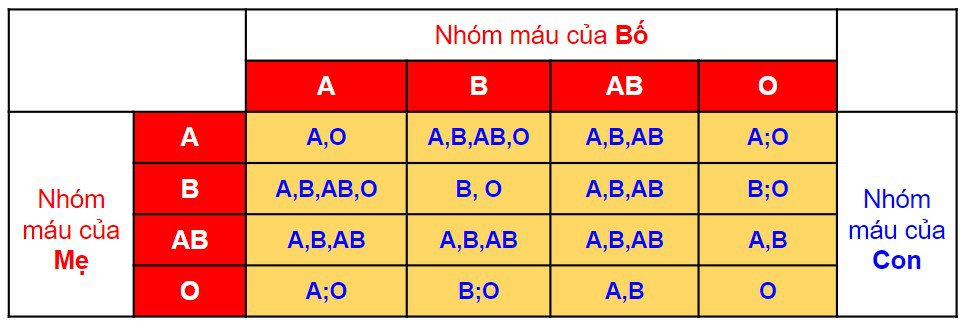
Nhóm máu O trong sơ đồ di truyền nhóm máu
2. Is blood type O rare?
In fact, people with blood type O are relatively common and account for about 37.4%. In Vietnam, this ratio is: group O will be about 42.1% So group O will not be classified as rare blood group.
In addition, people with group O can transfuse to all recipients with ABO blood group, so group O is also known as a donor blood group.
The blood grouping system currently in use is based on the principle of determining the presence of antigens on the surface of red blood cells. These red blood cell antigens all have certain health benefits, and it makes it easier for the immune system to detect foreign antigens that are potentially harmful when transfusions are incompatible. Therefore, we need to base on blood type to consider blood transfusion safely and with high medical effect.
Currently, science has discovered more than 30 blood group systems, but ABO and RH(D) groups are two extremely important groups because they have strong immunogenic properties.
O blood group is the most common blood group in the ABO blood group system. According to the latest statistics, about 42% of the Vietnamese population belongs to this blood group, of which the O+ group is predominant.
Because there are no antigens on the surface of red blood cells, group O blood can be transfused to people of all 4 blood types without any reaction.
Thus, blood group O is always prioritized for reserve because it can be used for emergency transfusion in case the blood type is not determined. In addition, for newborns, this blood type is also preferred because the child's immune system is not yet complete, can misrecognize and cause anaphylactic reactions when transfused.
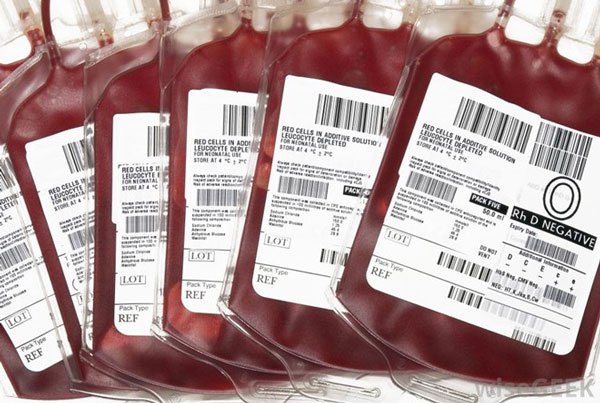
Nhóm máu o có hiếm không là thắc mắc của rất nhiều người hiện nay
3. What antibodies do blood group O have?
In a normal person, there is a natural antibody in the serum against an antigen that is absent from that individual's red blood cells. Specifically:
People with blood type A have anti-B antibodies; People with blood type B have anti-A antibodies; People with blood type O have both anti-A and anti-B antibodies; People with blood group AB do not have both anti-A and anti-B antibodies. The above characteristics and proportions of ABO blood groups in Caucasians and Vietnamese are shown in the following table:
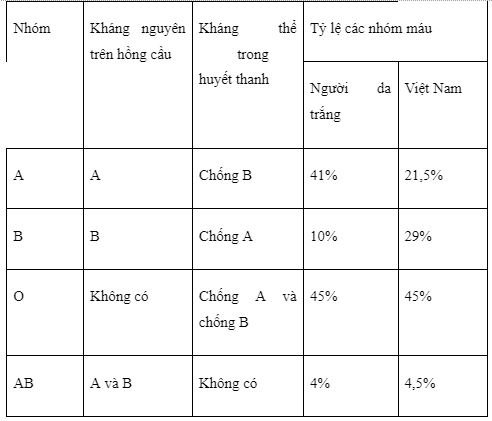
Based on the above characteristics, two methods are used to determine ABO blood group, which are:
Sample serotype method (Beth Vincent method): using sample serum carrying known specific antibodies to Identify antigens present on red blood cells. Red blood cell sample method (Simonin method): Using sample red blood cells with known antigens to detect antibodies in serum. These two methods are conducted in parallel to accurately determine the ABO blood group.
The nature of these natural antibodies is that IgMs have large molecular weight and bulky structure, so they cannot cross the vegetable membrane. They usually cause agglutination and do not break red blood cells if red blood cells are diluted, the suitable temperature for operation is 4 degrees Celsius, so they are called cold antibodies. When heated to 70 degrees Celsius, these antibodies will be neutralized.
The titers of human anti-A and anti-B antibodies in group O are generally higher than those of anti-A antibodies in group B and human anti-B antibodies in group A.
In addition to being present in the blood, antibodies This body is also present in other body fluids such as milk, saliva, and tears.
In fact, immunogenic anti-A and anti-B antibodies often arise due to blood type incompatibility between mother and child. When the baby's red blood cells carry antigens that the mother does not have, during the late stages of pregnancy or labor, some of the baby's red blood cells are transferred to the mother's blood, causing an immune response in the mother.
Immune antibodies (especially anti-A antibodies) are common in people with group O, these people will have much higher titers of anti-A antibodies in normal people, if not detected in time, whole blood transfusions plasma fractions or preparations taken from these people for group A would be dangerous. These group O people are called dangerous givers.
Patients with blood type O and blood type negative (Rh-) may have a lower risk of contracting coronavirus 2 (SARS-CoV-2) and severe coronavirus disease 2019 (COVID-19), according to a new study. The study was published in the Journal of Internal Medicine.
Investigators conducted a retrospective, population-based cohort study of 225,556 patients evaluated for ABO blood type between January 2007 and December 2019, then tested for SARS-CoV- 2 from January 15 to June 30, 2020. The median age was 53.8 years and 29% were male. Common comorbidities include pre-existing heart disease (13-15%), chronic kidney disease (11%), anemia (21%), cancer (27-29%), dementia or illness frailty (33-38%), diabetes mellitus (21%), asthma (18-21%) and chronic hypertension (39-41%).
The main outcome of the study was infection with SARS-CoV-2. The secondary outcome was severe COVID-19 illness or death. Adjusted relative risk (aRR) and absolute risk difference (ARD) were adjusted for demographic characteristics and comorbidities. For primary outcomes, analyzes were further stratified by patients younger than 70 years versus 70 years and older.
The most common blood type O in the world. People with blood type O can only receive blood from people with the same blood type O. However, people with blood type O can donate blood to all other blood types. In particular, people of blood type O have better resistance than people of other blood types.
Please dial HOTLINE for more information or register for an appointment HERE. Download MyVinmec app to make appointments faster and to manage your bookings easily.
This article is written for readers from Sài Gòn, Hà Nội, Hồ Chí Minh, Phú Quốc, Nha Trang, Hạ Long, Hải Phòng, Đà Nẵng.

